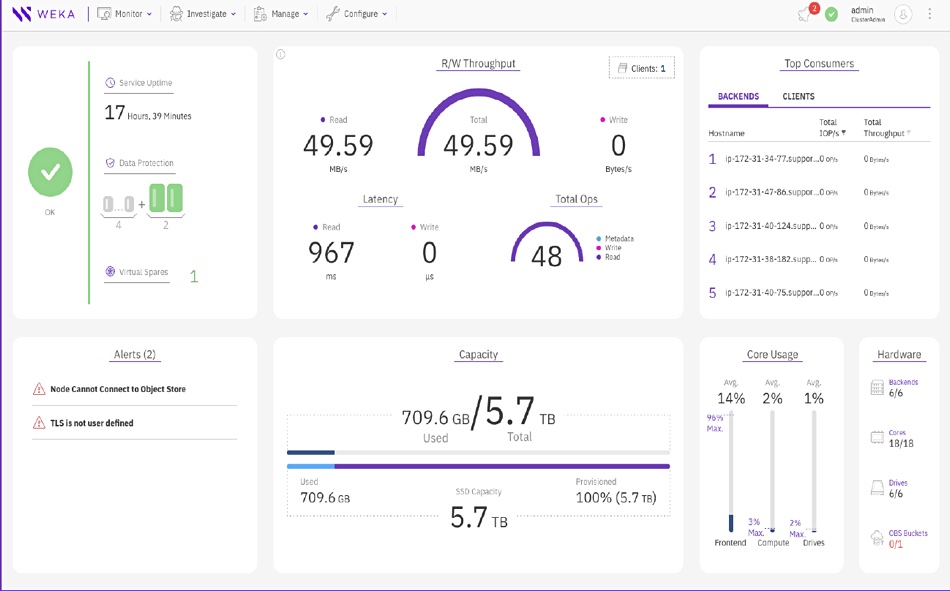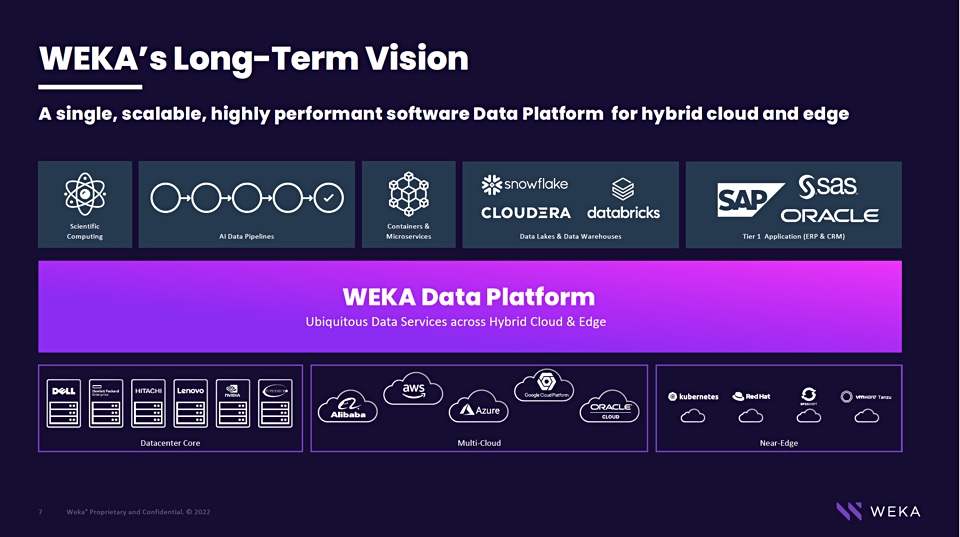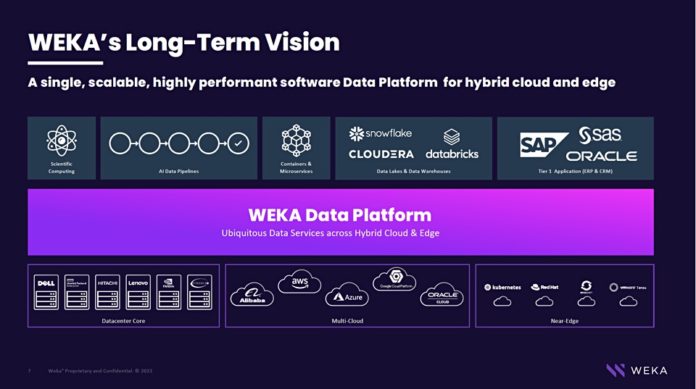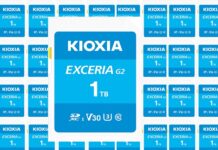WEKA has ported its filesystem code, which runs natively in AWS, to the Azure, Google, and Oracle clouds with a v4.0 release adding filesystem-wide data reduction, tiering to local and cloud object storage, better NFS and SMB support, an improved UI, and new packages and pricing.
The high-speed, scale-out, parallel filesystem supplier says that many enterprise do not run mission-critical applications in the cloud because of lock-in, costs, proprietary cloud formats, and performance. WEKA claims its v4 product delivers consistent high performance, robust data services, and a seamless, simplified data management experience with best-in-class economics in the public cloud, datacenters, and edge environments. The company runs the same binary in the clouds and on vendors’ servers but with different integrations underneath.
WEKA aims to be a global filesystem.
Liran Zvibel, WEKA co-founder and CEO, said in a statement: “The world’s largest enterprises and research organizations are now doubling down on using AI and ML at scale to support innovation, discovery, and business breakthroughs. Hyperscale public clouds like AWS, Azure, GCP and OCI can provide the requisite agility and economies of scale needed to fuel these critical transformation and innovation engines, but the WEKA Data Platform is the key to unlocking that value for AI/ML workloads in hybrid and now multi-cloud environments. WEKA can uniquely help enterprises to avoid cloud lock-in and run their businesses with unparalleled economics.”
WEKA supports NFS v3 and the v4 WEKA code adds support for NFS v4.1, with features natively integrated into WEKA’s code stack. It also supports SMB-W, a WEKA implementation of SMB providing improved latency and small file performance. This is, we were told, suitable for high-performance MS-Windows workloads.

Storage cost reduction
WEKA v4 provides replication between edge, on-premises, hybrid and multi-cloud environments, and three ways to reduce costs of storing data in these places. Firstly, ageing primary data can be moved onto less expensive local or cloud object storage within a global namespace. This uses a Snap-To-Object feature that enables the committing of a specific snapshot to an object store.
WEKA’s chief product officer, Nilesh Patel, told an IT press Tour that this incrementally and continuously promotes filesystem changes (deltas) non-disruptively to the cloud (or to the on-premises object store) with a very lightweight implementation. Unlike data life cycle management processes, he said, this feature involves all the snapshot, which includes data, metadata, and every file. This facility can also be used to keep two sites concurrent.
He said that WEKA provides instant (milliseconds) object retrieval from AWS Glacier and will provide the same fast retrieval from on-premises S3 stores soon.
Secondly, WEKA can use capacity-optimized QLC or performance-optimized (TLC) NVMe drives, and, thirdly, there is a new, filesystem-wide data reduction to increase effective capacity.
The data reduction uses variable length blocks and a similarity hash (fingerprinting) with compression. Patel said: “We have a logical directory tree that contain fragments of different sizes of file that probably have the same similarity hash. This logical directory tree is invisible to customers and is used for global data reduction.”
v4 will be available in four software packages said to be aligned to its customers’ primary use cases, with the option of subscription or consumption-based pricing. There were no details of these four packages available at publication time.
For more details, read a WEKA blog and point your browser at WEKA’s multicloud webpage.
Comment
This is a comprehensive code update by WEKA and its consistent environment across the on-premises, AWS, Azure, GCP, and Oracle clouds will surely be welcomed by customers. The data reduction and storage tiering features will likewise be applauded as a way of keeping costs in check. WEKA very much wants to be a platform on which to run mission-critical apps, like databases, and says block storage is not necessary; there is no speed advantage. In this it shares the same viewpoint as VAST Data.

WEKA says it has 1EB+ under management, approximately 20 large enterprise customers, with eight of the Fortune 50 and 60 of the Fortune 100 in its customer roster. It has 40 Gartner peer review results with an average score of 4.9 out of 5 stars. Board member Dan Warmenhoven, ex-chairman of NetApp, thinks WEKA will be as influential as NetApp was in the 1990s.
WEKA’s view is that the public cloud will be a significant force in the years to come, and that means it has to use hardware-agnostic technology. We think WEKA may well support other CPU architectures apart from x86 in the future. It will also pay more attention to big data, data lakes, and warehouses (Cloudera-type stuff).








